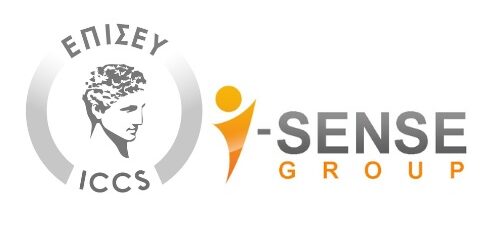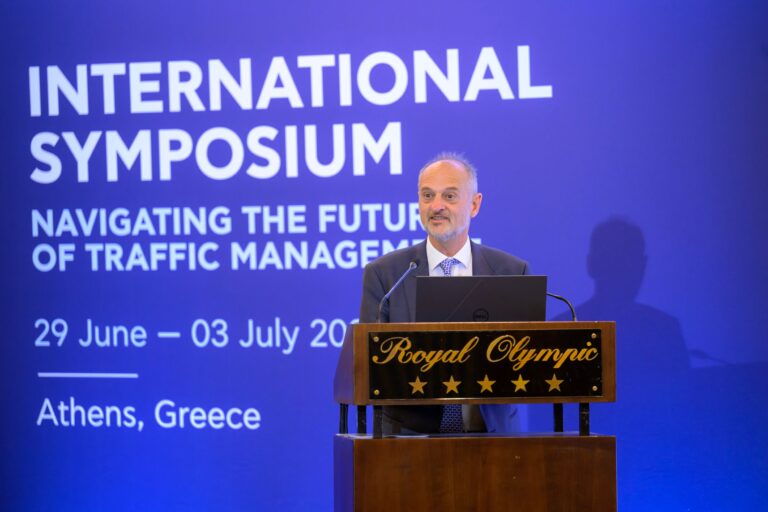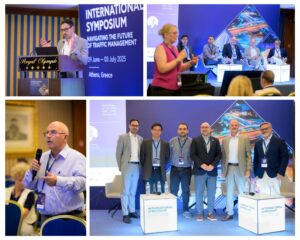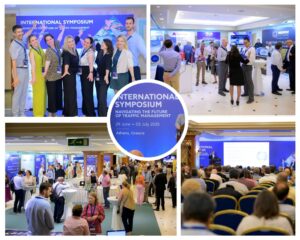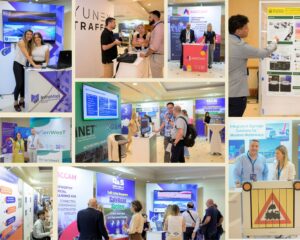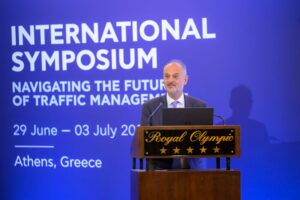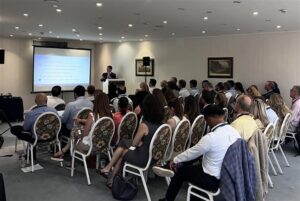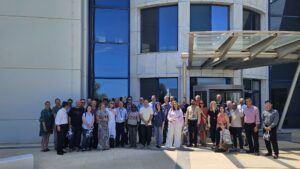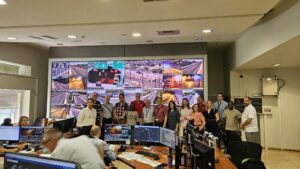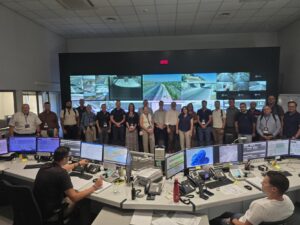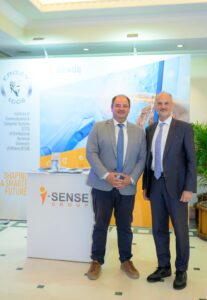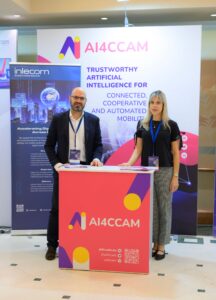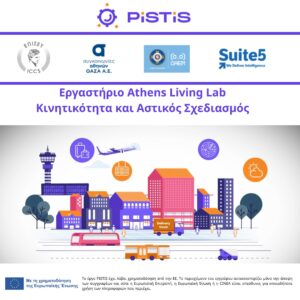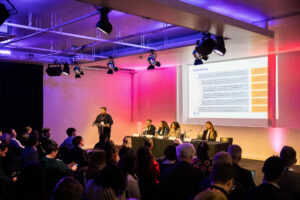After five dynamic days of exchange, innovation, and global collaboration, the International Symposium “Navigating the Future of Traffic Management” successfully concluded in Athens, leaving behind a renewed sense of purpose and international momentum in the evolution of mobility and traffic management systems.
Held from 29 June to 3 July 2025 at the Royal Olympic Hotel, the Symposium brought together more than 400 participants, over 100 international speakers from 35 countries, and representatives from leading institutions, public authorities, startups, and private-sector innovators. Organized by the Institute of Communication and Computer Systems (ICCS) of the National Technical University of Athens (NTUA), in collaboration with globally recognized key organisations, the Symposium served as a crucial platform to shape the future of traffic management in a world increasingly defined by connectivity, climate consciousness, and urban transformation.
A Global Coalition
Among the international partners were prominent institutions such as the American Society of Civil Engineers (ASCE), Transportation and Development Institute (T&DI), ASECAP, AustriaTech, and the Conference of European Directors of Roads (CEDR), ERTICO and ERTICO TM2.0, along with the European Commission DG MOVE, Hellastron, and other global industry leaders such as the the Transportation Research Board (TRB), International Bridge, Tunnel, and Turnpike Association (IBTTA) and the International Road Federation (IRF), ITS Nationals, and PIARC (World Road Association) all of which play a crucial role in shaping the future of roads and transport systems worldwide.The event was made possible through the support of e a diverse range of organizations dedicated to advancing transportation and infrastructure development. These partners include the American Society of Civil Engineers (ASCE), Transportation and Development Institute (T&DI), ASECAP, AustriaTech, and the Conference of European Directors of Roads (CEDR), ERTICO and ERTICO TM2.0, along with the European Commission DG MOVE, Hellastron, and other global industry leaders such as the the Transportation Research Board (TRB), International Bridge, Tunnel, and Turnpike Association (IBTTA) and the International Road Federation (IRF), ITS Nationals, and PIARC (World Road Association) all of which play a crucial role in shaping the future of roads and transport systems worldwide.
Over 17 exhibiting organizations and key national and global players in the field of traffic management took part in the mini exhibition in the Olympia Hall.
- Gold Sponsor: Highway Software
- Grand Sponsor for Student Awards: ARMIS Group
- Silver Sponsors: SALFO, SWARCO, VITRONIC, SHMA & Triple Sign
- Bronze Sponsors & Exhibitors: CERTH/HIT, IRF, Milligan, MOBITO, PTV Group, IRF, INLECOM, NTUA Road Safety Observatory, and Chinese institutions including CHTS, Beijing Municipal Engineering Design & Research Institute, and Nansha Bridge – Guangdong Highway Co. Inframap, Q&S, Yunex Traffic, PSM
The Symposium was held under the auspices of the Hellenic Ministry of Infrastructure and Transport, the Ministry of Digital Governance, the Representation of the European Commission in Greece, and the Region of Attica.
A Living Laboratory of Innovation
Central to the event’s success was the mini technology exhibition held from 1–2 July. The Exhibition transformed the venue into a vibrant innovation hub, showcasing cutting-edge solutions—from AI-driven traffic platforms and connected infrastructure, to automated mobility systems and real-time transport analytics.
The I-SENSE Group / ICCS booth featured a range of EU-funded projects, including PoDIUM, DELPHI_EU, EVENTSproject22, eBRT2030, IN2CCAM, and Hi-Drive, highlighting the university’s active role in pioneering research. The exhibition drew strong interest from transport operators, engineers, public authorities, researchers, and technology providers from across Europe and beyond.
Programme Highlights
The Symposium officially opened with a high-level plenary session titled “Navigating the Future of Traffic Management” in the Olympia Hall, setting the tone for the days ahead. The session began with welcoming remarks from Konstantinos Karantzalos, Secretary General of Telecommunications & Posts from the Ministry of Digital Governance, Dr Angelos Amditis R&D Director of ICCS and ERTICO- ITS Europe Chairman and Jon Obenberger, JTO Transportation Consulting, Chair TRB Standing Committee on ITS (ACP15), and Symposium Programme Lead. Dr Johanna Tzanidaki of the TRB ITS Committee moderated a rich panel discussion that brought together leading voices from the public and private sectors. The panel hosted contribution from Bill Halkias (CEO of Nea Attiki Odos) who explored the challenges and opportunities in building smarter, safer traffic ecosystems and featured two dynamic “firechat” interviews—one with representative of the Secretary General for Spatial Planning and Urban Environment, Avgi Vassi, and another with Mike Wilson, Sales Director at Highway Software—offering personal insights into the intersection of planning, technology, and innovation in urban mobility.
“I am deeply proud to welcome you all to Athens—a city that almost 20 years ago, hosted the very first edition of this international symposium,” said Dr. Angelos Amditis, Chair of the Symposium, R&D Director of ICCS and ERTICO-ITS Europe Chairman. “Much has changed since then. Traffic management has been completely reshaped by intelligent technologies, data-driven decision-making, and a rapidly growing ecosystem of public and private actors. What was once a field of static infrastructure is now a dynamic, interconnected system—powered by innovation and shaped by collaboration. The success of our mobility depends on shared systems, shared standards, and shared trust. Safety, sustainability, efficiency—these cannot be achieved in isolation. That’s why synergies matter. That’s why partnerships matter. And that is what this Symposium is here to build: real, working bridges between countries, disciplines, public and private sectors, and generations. Far from simply discussing technology—we are designing trust. Welcome to Athens”
The Symposium featured five thematic tracks spanning policy, research, and innovation, tackling key topics such as:
- Intelligent traffic signal systems
- Real-time traffic monitoring
- Smart infrastructure integration
- Sustainable urban mobility strategies
- Dynamic pricing and CCAM (Connected, Cooperative & Automated Mobility)
Participants engaged in keynote sessions, technical workshops, poster presentations, and site visits, all geared toward practical knowledge-sharing and solution development.
The Symposium provided the setting on 30 June 2025, as International Road Federation (IRF) board members, secretariat staff and delegates convened in the Royal Olympic Hotel and online for the IRF’s hybrid General Assembly.
PIARC Workshop on ‘Digitalization in road transport: challenges and opportunities to deliver better services to road users’ took part also during the Symposium.
Celebrating Students’ Excellence and Partnership
A highlight of the Symposium was the Student Paper Award Ceremony, honoring emerging voices in traffic innovation. Congratulations to this year’s winners:
- Cesar Andriola
- Yangjiao Chen
- Michael Urbiztondo
Sponsored by ARMIS Group, the awards underscored the importance of nurturing the next generation of transport leaders. Read the Interviews of the winners.
ICCS Powers the Symposium’s Success
The Institute of Communication and Computer Systems (ICCS) of the National Technical University of Athens (NTUA) served not only as the local organizer of the International Symposium “Navigating the Future of Traffic Management” but also as a central pillar in its scientific and operational success. With researchers contributing to the technical programme, moderating sessions, and sharing results from cutting-edge EU-funded projects, ICCS of NTUA reaffirmed its central role in both the organisation and the intellectual foundation of the event.
Under the leadership of Dr. Angelos Amditis, ICCS’s R&D Director and Chairman of ERTICO – ITS Europe, who also served as Chair of the Symposium, ICCS played a prominent role across the event’s programme and sessions. ICCS’s contributions spanned data-driven mobility, smart logistics, Cooperative Connected and Automated Mobility (CCAM), and urban transport innovation. Ongoing EU-funded research projects such as PoDIUM, DELPHI, EVENTS, eBRT2030, IN2CCAM, and Hi-Drive were showcased through presentations and at the ICCS/ISENSE booth in the technology exhibition, reflecting the Institute’s commitment to shaping sustainable, resilient, and intelligent transport systems.
National Contributions Enrich Dialogue on the Future of Traffic
High-level representatives from key Greek organizations and companies actively participated in the programme, underlining the strategic importance of traffic innovation for national policy and infrastructure planning. Professor Konstantinos Karatzalos, General Secretary for Telecommunications and Post at the Ministry of Digital Governance, took part in the high-level programme, emphasizing the country’s digital transformation strategy and the critical role of data-driven systems in future mobility. The Hellenic Ministry of Environment and Energy was represented in the Symposium’s high-level sessions by Mrs Avgi Vassi, contributing to key discussions on the intersection of environmental policy, sustainable transport, and technological innovation.
The Symposium was held under the auspices of the Hellenic Ministry of Infrastructure and Transport, the Ministry of Digital Governance, the Attica Region, and the Representation of the European Commission in Greece, reinforcing its significance at both national and European levels.
Real-World Insights and Innovation Take Center Stage at International Traffic Symposium
The Symposium also benefited from the active involvement of key Greek stakeholders and infrastructure operators, offering participants valuable insights into the local context of traffic management. Two highly successful technical visits were organised in collaboration with Nea Attiki Odos and Olympia Odos, giving delegates a firsthand look into the operation of advanced Traffic Management Centres and the application of intelligent systems on key national motorways. These site visits offered a real-world complement to the Symposium’s theoretical and policy discussions, showcasing how innovation is being deployed in practice within Greece
Looking Ahead
As the Symposium concluded, it left a powerful imprint of possibility and cooperation. In the words of one participant:“The most inspiring part wasn’t just the technology—it was seeing a truly international community come alive again, growing stronger with every exchange.”
With the 2025 Symposium now behind us, ICCS and its partners remain committed to pushing the boundaries of innovation, fostering strategic collaboration, and redefining the future of traffic and mobility systems.
For more information and post-event resources, visit:
👉 https://traffic-management-symposium-2025.com




